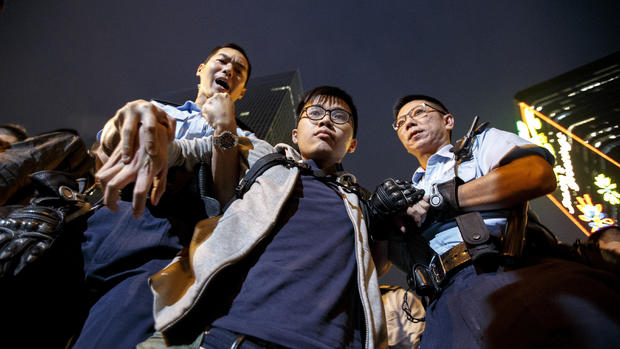Hong Kong protesters reject talks with government
HONG KONG -- Pro-democracy protesters in Hong Kong canceled talks with the government on electoral reforms after mobs of people tried to drive them from the streets they have occupied for a week.
The Hong Kong Federation of Students, one of the groups leading the protests that swelled to the tens of thousands earlier this week, said they saw no choice but to cancel the talks.
"The government is demanding the streets be cleared. We call upon all Hong Kong people to immediately come to protect our positions and fight to the end," the group said in a statement.
Hong Kong's leader, Chief Executive Leung Chun-ying, proposed the talks late Thursday, seeking to defuse the standoff, the biggest challenge to Beijing's authority since China took control of the former British colony in 1997.
His refusal to yield to calls for his resignation angered many protesters. They demanded that the government hold someone responsible for the scuffles Friday in Kowloon's crowded Mong Kok district and other areas, the most chaotic since police used tear gas and pepper spray last weekend to try to disperse them.
Just as those tactics ended up drawing more people into the streets, the attacks on Friday drew hundreds of supporters.
In the afternoon, democracy activists linked arms and held hands as they tried to stand their ground. Police formed cordons and escorted some of the protesters away as hundreds of onlookers chanted, "Pack up!" and "Go home!"
But the tide seemed to turn in the evening, when hundreds assembled, shouting at the opponents of the protesters and haranguing police to protect them. Police ended up escorting some of the mob of people in their 30s and older out of the area.
It was unclear if the people trying to drive out the protesters were organized, though some wore blue ribbons signaling their support for the mainland Chinese government, while the protesters have worn yellow ribbons.
At least some were local residents fed up with the inconvenience of blocked streets and closed shops. They may have been encouraged by orders from police for the protesters to stop blocking the streets.
The chaos prompted orders from police and other top officials to all to avoid violence and go home.
"We should not use violence or disrupt social order in any situation," Leung said. "All people gathering in those areas should disperse as soon as possible and restore social order, so that daily lives will be restored to normal."
Protesters had set a midnight deadline for the Beijing-backed Leung to step down, threatening to "occupy" a government building if he remained in office.
CBS News correspondent Seth Doane was there as the deadline approached: police with riot gear on one side of the barricades, and protesters on the other.
The protesters starting putting on masks and goggles and raising sheets of plastic to protect themselves. They were worried about a possible crackdown.
But at 11:30 p.m., Leung held a press conference and made it clear he would not be stepping down, but announced the appointment of his deputy to talk with protesters.
An agitated crowd chanted to each other in Cantonese: "keep calm."
Asked what he thought of how the events came to pass, a protester named Ivan asked Doane, "Can I swear?" And then replied bluntly: "It's a lot of crap."
At 20, Ivan is typical of many of the protesters, and he said he was worried that the presence of several different protest groups makes it difficult for the pro-democracy movement to present a clear vision.
"No one has done anything -- no one has said anything that has meaning tonight," said Ivan, conveying his disappointment. "There's no conclusions, no one has an idea of what to do next. Everyone's lost."
He said he would just have to "wait and see."
"Wait and see" was very much the order of the day in Hong Kong. A front-page article in the People's Daily," the Communist Party mouthpiece, reminded Chinese of the government's official stance; that the protesters' demands for "unfettered elections" were "neither legal... nor reasonable."
The stock market in vital Asian powerhouse that is Hong Kong has been down all week. The number of tourists is down, too, and protesters know that keeping the goodwill of Hong Kong's residents is an important piece of this.
